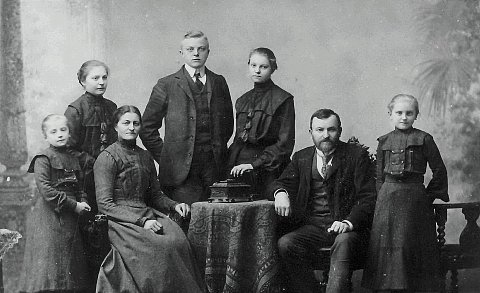-
iGENEA Basic
review on February 18, 2014
by Craig Macpherson

At a Glance
Summary
In summary, I’d say the iGENEA Basic test is expensive considering you have to choose a maternal or paternal analysis, instead of receiving both. The information you receive explains the results well, and access to the FTDNA database is a great feature, but it was confusing to be given two paternal haplogroups.
All in all, if you’re looking for a genetic ancestry test for beginners or as a gift, iGENEA is satisfactory, but your money may go further elsewhere.
Please note that this test may have changed since our review was written. To ensure you know what to expect from this test, please check the company's website.
Full Review
The iGENEA website offered three genetic ancestry tests: Basic, premium and expert. All tests included access to a 'family finder' database to help me trace my living relatives, and I was told that this database is run by Family Tree DNA (FTDNA), a separate genetic ancestry company in the US.
I chose the iGENEA Basic test. I had the option to test my maternal lineage which analysed the HVR1 and HVR2 regions of my mitochondrial DNA, or my paternal lineage which analysed 37 markers on my Y chromosome. I opted for the paternal analysis.
Product Expectations
The website was nicely laid out and easy to use, a preview of the paternal results was available so I could see what I was buying. I was told I'd receive a written ancestry report, a ‘Y certificate’, and an ancestral migratory map. In addition, I’d be shown a list of my living relatives - aka my 'matches' - on the FTDNA database where I shared a paternal ancestor with those individuals. The contact details for my matches would also be available should I want to get in touch.
Ordering Experience
The process for buying the test was quick and simple, and I received the kit just one working day after ordering. The cheek swab sample was easy to take and an addressed envelope for returning the samples was included – I was disappointed that I had to pay an extra $5 for return postage. I received confirmation that my samples had been received by the lab nine working days after sending them off.
The Results
I was sent an email ten weeks later to tell me the results were ready online, and I received a physical version of the results in the post six working days after that. When I logged in to see my results online I was invited to download a four page 'DNA Genealogy' PDF to help me interpret my results, and shown a results pane which displayed my paternal analysis.
The online account gave me the option to buy further tests, including one for a ‘Monoamine Oxidase A’ gene – aka the ‘Warrior Gene’ – which apparently causes its carriers to be more willing to make and take calculated risks!
Results Section: Results Pane
The results pane (shown below) showed I was in haplogroup ‘R-M269’, that my ancient tribe was 'Celts or Germanic peoples', and that my region of origin was Western Europe. There was also a small interactive map which appeared to show the migratory paths of haplogroup R (the broader group that I’m in) from South Western Asia into Europe.
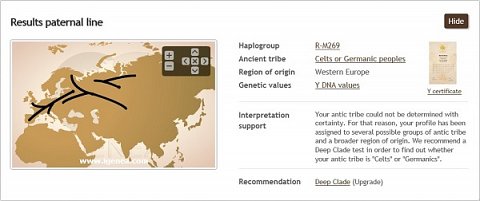
The results pane for my paternal line.
I was disappointed that my ancient tribe was so vague and that my region of origin wasn't more specific. I also wish the interactive map had given me more detail about the migratory path of my specific haplogroup R-M269.
An online version of my Y certificate was provided (shown below), and a list of the Y DNA markers that had been used for my paternal analysis was displayed.
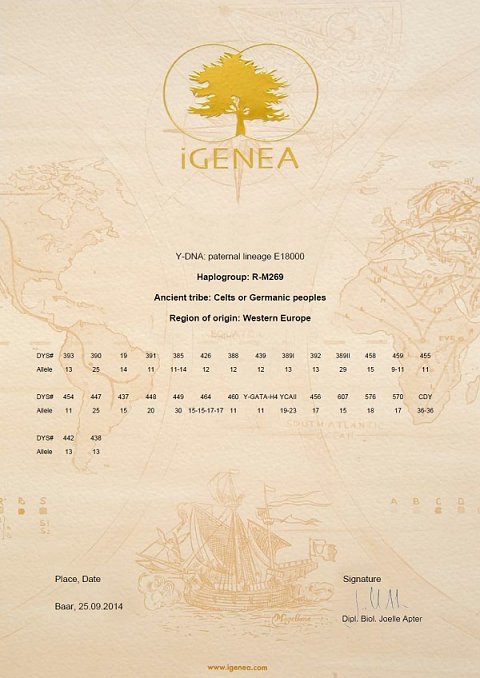
My Y-DNA certificate.
At the bottom of the pane it was recommended that I buy a 'Deep Clade' test, so iGENEA could work out the specific ancient tribe that I’m descended from.
Results Section: FTDNA Database
Beneath the results pane I was invited to log in to the FTDNA database which would help me find my living relatives. Upon entering the FTDNA online account I was given another paternal haplogroup (predicted as R-P312), which was unsettling as the results pane indicated my haplogroup was R-M269. FTDNA gave an additional description of my paternal ancestors’ migratory path, and showed my ‘haplotree’ (shown below) that indicated where my haplogroup sat in relation to others.
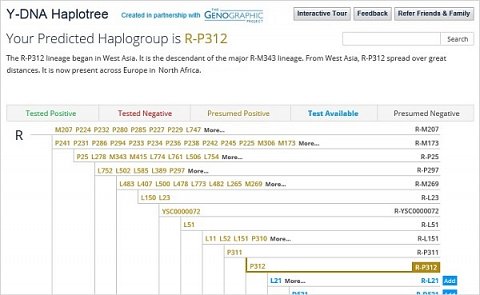
The location of my predicted haplogroup on the Y-DNA haplotree.
When using the FTDNA database to search for the living relatives I shared a common paternal ancestor with; I had no matches at 37 Y-DNA markers, but two matches at 25 Y-DNA markers (shown below). Contact details were provided for these matches and I could see the name of one of the common ancestors we shared.
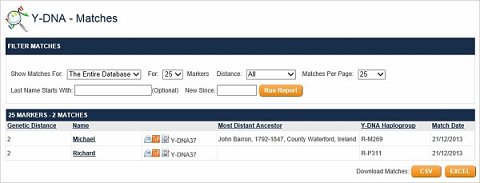
My Y-DNA matches at 25 markers.
Results Section: DNA Genealogy PDF
On returning to the iGENEA online account I reviewed the DNA Genealogy PDF which gave me more information about DNA and how DNA testing is used for ancestral analysis. I was told that my ancient tribe (Celts or Germanic peoples) indicated my ancestors’ ethnicity from 900 BC to 900 AD, and was based on anthropological and scientific studies.
I learned that my region of origin (Western Europe) is the geographic area where my genetic profile is most common, and that ancestors from these regions will have lived between 500 and 1,500 AD. It was suggested that by researching my own family history my region of origin could be refined, but I felt this advice partially defeated the object of taking the test in the first place.
Results Section: Physical Results
The documents sent to me in the post contained a personalised letter, a list of genetic ancestry upgrades I could buy, a hard copy of my A4 Y certificate, a large map showing all paternal and maternal haplogroup migratory paths, and a hard copy of the DNA Genealogy PDF.
Summary
In summary, I’d say the iGENEA Basic test is expensive considering you have to choose a maternal or paternal analysis, instead of receiving both. The information you receive explains the results well, and access to the FTDNA database is a great feature, but it was confusing to be given two paternal haplogroups.
All in all, if you’re looking for a genetic ancestry test for beginners or as a gift, iGENEA is satisfactory, but your money may go further elsewhere.
Please note that this test may have changed since our review was written. To ensure you know what to expect from this test, please check the company's website.

